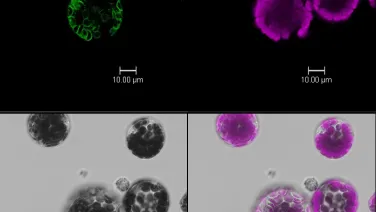PS Seminar Series: Molecular coordination between plant surface and intracellular immune receptors
Plants rely on their sophisticated innate immune system to protect themselves from surrounding disease-causing pathogens.
Speakers
Event series
Content navigation
Description

Abstract: Plants rely on their sophisticated innate immune system to protect themselves from surrounding disease-causing pathogens. For successful defence against pathogens, accurate and efficient activation of immune signalling is important upon infection. Plants have two-layered immune perception system consisting of pattern-triggered immunity (PTI) and effector-triggered immunity (ETI). PTI is activated upon perception of conserved microbial molecules, such as flagellin and elongation factor-Tu, by cell-surface pattern recognition receptors (PRRs). Successful pathogens can deliver virulence effectors with various biochemical activities into plant cells, which can target PTI components and disturb plant defence. In turn, plant intracellular immune receptors, which are mainly nucleotide-binding domain leucine-rich repeat receptors (NLRs), can detect such effectors and activate ETI. PTI and ETI have previously been studied mostly as two layers, despite sharing significant overlapping downstream signalling components. The mechanisms linking PTI and ETI are however largely unknown. In my presentation, I will present recent findings illustrating how PRR complexes regulate NLRs and therefore ETI.
Biography: Sera Choi completed her PhD at Massey University in New Zealand and did a first postdoc as Postech in South Korea in the group of Keehoon Sohn. During this time, she focused on dissecting molecular mechanisms of plant immunity activated by diverse pathogen effectors. Since 2021, she is working as a postdoc in the Cyril Zipfel’s group at the University of Zurich in Switzerland where she is deciphering the molecular mechanisms regulating plant immune receptors.
Location
Eucalyptus Seminar Room,
Rm S205, Level 2,
RN Robertson Building (46)

